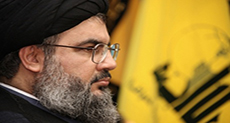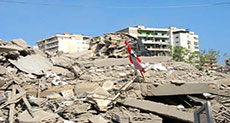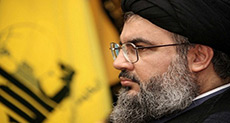
Winning hearts and minds: Hizbullah shows how

Source: IRIN News.org, 31-3-2006
Party of god runs extensive social program in marginalized areas of the country
BEIRUT: "The hand that fights, the hand that builds" is the Hizbullah slogan that sums up the essence of Lebanon`s "party of God": one hand to protect the party`s mainly Shiite following - with arms, if necessary; the other to improve its living conditions. The two hands come together around the party`s blue and yellow collection tins that stand on every corner of south Beirut and throughout South Lebanon.
The world generally focuses on only one aspect of Hizbullah: the hand holding up a Kalashnikov rifle, as featured on the party flag.
Earlier this week, Washington froze the U.S.-based assets of the Al-Manar satellite television station and the Al-Nour radio station, along with those of parent company Lebanese Media Group, said to be closely linked to Hizbullah.
The U.S. blames the group for a 1983 truck bombing that killed 241 U.S. marines in Beirut. It also accuses Hizbullah of being behind a series of kidnappings of U.S. nationals in Lebanon in the late 1980s.
UN Resolution 1559, adopted on September 2, 2004, calls for "the disbanding and disarmament of all Lebanese and non-Lebanese militias." So far, however, Hizbullah - along with armed Palestinian groups present in Lebanon - have refused to comply.
Founded in 1982 in response to the "Israeli" invasion of Lebanon, Hizbullah argues that its armed wing is not a militia, but a legitimate resistance. According to its 1985 manifesto, the group`s aim was to expel "Israeli" troops from Lebanon.
In elections last May, Hizbullah won 23 out of 128 parliamentary seats and became a member of the current coalition government.
Hizbullah not only has armed and political wings - it also boasts an extensive social development program. The group currently operates at least four hospitals, 12 clinics, 12 schools and two agricultural centers that provide farmers with technical assistance and training. It also has an environmental department and an extensive social assistance program. Medical care is also cheaper than in most of the country`s private hospitals and free for Hizbullah members.
Most of these institutions are located in the country`s more marginalized areas, such as Beirut`s southern suburbs, in South Lebanon and in the Bekaa Valley. "We have special sections all over the country that provide financial and food assistance to the poor," said Hizbullah spokesman Hussein Naboulsi. "We also run an emergency fund for instant care in case of immediate hospitalization."
One beneficiary of Hizbullah financial aid is 35-year-old Alia. She and her three children live in a one-room apartment 15 kilometers east of Beirut. Originally Druze, Alia converted to Shiite Islam after marrying an Egyptian Shiite, which led to her being ostracized by her family.
Life did not get any easier after her husband was sent to jail three years ago, for reasons Alia prefers not to disclose. While she now works part-time as a cleaning lady, Alia hardly has enough money to put food on the table. "Fortunately, Hizbullah supports us with $100 month," she said. "It`s still not enough, but it keeps us alive."
According to the UNDP Living Conditions Index, 35.2 percent of the Lebanese population lives below the satisfaction threshold. These are divided between households with a very low degree of satisfaction (7.1 percent) and those having a low degree of satisfaction (25 percent). Households having an intermediate satisfaction represent 41.6 percent of households, which leaves 26.4 percent of households with a high degree of satisfaction.
Geographically, the districts of Akkar, Baalbek, Nabatieh and South Lebanon register the lowest annual average incomes. Hizbullah is strongly represented in all these areas except for northern Akkar. "Last week, I visited a widow with three daughters in Nabatieh," said Naboulsi. "We gave them a refrigerator, a washing machine and a stove. Still, the poverty in which they live is shocking."
The group`s social work is strongly rooted in the Shiite faith. Naboulsi cited the example of the fourth Imam, Ali Zein al-Abedine (680 AD - 712 AD), who used to anonymously leave food and money at the doors of the poor.
"For years, no one knew who the mysterious benefactor was," explained Naboulsi. "But after Zein al-Abedine`s death, the bags stopped coming and only then did people realize it was him." According to Naboulsi, the Imam`s example is one reason Hizbullah prefers not to reveal the extent and value of its socio-economic activities.
Another reason for secrecy, though, is that the party says it does not want to give its enemies the chance to establish its social and financial strength. Most experts believe that Hizbullah`s social and health programs are worth hundreds of millions of dollars annually.
Hizbullah mainly gets its money from donations. Lebanese Shiites often make contributions directly after prayers, leaving change in the two-handed Hizbullah collection tins. According to frequent accounts in the western press, the group also receives considerable support from Iran and Syria.
"It`s no secret that Hizbullah receives financial help from Iran, but not from Syria," said Naboulsi. "Syria`s too poor. People always point to the fact that we get money from Iran, but don`t mention the fact that the United States gives $3 billion a year to "Israel"."
According to Naboulsi, donating money on a yearly basis, known as zakat is the duty of any good Muslim. The Islamic holy book, the Koran, states that all those who have the means should donate 2.5 percent of their wealth to the needy.
Despite increasing pressure from the United Nations and countries such as the United States, the U.K. and France, Hizbullah refuses to give up its weapons.
This is mainly because it defines itself as "a resistance movement" rather than a "militia," to which UN Resolution 1559 refers. According to Hizbullah, the group will maintain its arms as long as "Israel" continues to occupy the Shibaa Farms area in the extreme south of the country. The United Nations, however, maintains that the Shibaa Farms are Syrian.
Most importantly, perhaps, Hizbullah leader Hassan Nasrallah has repeatedly stated that the group is willing to disarm when presented with "a viable alternative to resistance." "But as long as "Israel" remains a threat to Lebanon, we have the right to bear arms," he maintains.
Party of god runs extensive social program in marginalized areas of the country
BEIRUT: "The hand that fights, the hand that builds" is the Hizbullah slogan that sums up the essence of Lebanon`s "party of God": one hand to protect the party`s mainly Shiite following - with arms, if necessary; the other to improve its living conditions. The two hands come together around the party`s blue and yellow collection tins that stand on every corner of south Beirut and throughout South Lebanon.
The world generally focuses on only one aspect of Hizbullah: the hand holding up a Kalashnikov rifle, as featured on the party flag.
Earlier this week, Washington froze the U.S.-based assets of the Al-Manar satellite television station and the Al-Nour radio station, along with those of parent company Lebanese Media Group, said to be closely linked to Hizbullah.
The U.S. blames the group for a 1983 truck bombing that killed 241 U.S. marines in Beirut. It also accuses Hizbullah of being behind a series of kidnappings of U.S. nationals in Lebanon in the late 1980s.
UN Resolution 1559, adopted on September 2, 2004, calls for "the disbanding and disarmament of all Lebanese and non-Lebanese militias." So far, however, Hizbullah - along with armed Palestinian groups present in Lebanon - have refused to comply.
Founded in 1982 in response to the "Israeli" invasion of Lebanon, Hizbullah argues that its armed wing is not a militia, but a legitimate resistance. According to its 1985 manifesto, the group`s aim was to expel "Israeli" troops from Lebanon.
In elections last May, Hizbullah won 23 out of 128 parliamentary seats and became a member of the current coalition government.
Hizbullah not only has armed and political wings - it also boasts an extensive social development program. The group currently operates at least four hospitals, 12 clinics, 12 schools and two agricultural centers that provide farmers with technical assistance and training. It also has an environmental department and an extensive social assistance program. Medical care is also cheaper than in most of the country`s private hospitals and free for Hizbullah members.
Most of these institutions are located in the country`s more marginalized areas, such as Beirut`s southern suburbs, in South Lebanon and in the Bekaa Valley. "We have special sections all over the country that provide financial and food assistance to the poor," said Hizbullah spokesman Hussein Naboulsi. "We also run an emergency fund for instant care in case of immediate hospitalization."
One beneficiary of Hizbullah financial aid is 35-year-old Alia. She and her three children live in a one-room apartment 15 kilometers east of Beirut. Originally Druze, Alia converted to Shiite Islam after marrying an Egyptian Shiite, which led to her being ostracized by her family.
Life did not get any easier after her husband was sent to jail three years ago, for reasons Alia prefers not to disclose. While she now works part-time as a cleaning lady, Alia hardly has enough money to put food on the table. "Fortunately, Hizbullah supports us with $100 month," she said. "It`s still not enough, but it keeps us alive."
According to the UNDP Living Conditions Index, 35.2 percent of the Lebanese population lives below the satisfaction threshold. These are divided between households with a very low degree of satisfaction (7.1 percent) and those having a low degree of satisfaction (25 percent). Households having an intermediate satisfaction represent 41.6 percent of households, which leaves 26.4 percent of households with a high degree of satisfaction.
Geographically, the districts of Akkar, Baalbek, Nabatieh and South Lebanon register the lowest annual average incomes. Hizbullah is strongly represented in all these areas except for northern Akkar. "Last week, I visited a widow with three daughters in Nabatieh," said Naboulsi. "We gave them a refrigerator, a washing machine and a stove. Still, the poverty in which they live is shocking."
The group`s social work is strongly rooted in the Shiite faith. Naboulsi cited the example of the fourth Imam, Ali Zein al-Abedine (680 AD - 712 AD), who used to anonymously leave food and money at the doors of the poor.
"For years, no one knew who the mysterious benefactor was," explained Naboulsi. "But after Zein al-Abedine`s death, the bags stopped coming and only then did people realize it was him." According to Naboulsi, the Imam`s example is one reason Hizbullah prefers not to reveal the extent and value of its socio-economic activities.
Another reason for secrecy, though, is that the party says it does not want to give its enemies the chance to establish its social and financial strength. Most experts believe that Hizbullah`s social and health programs are worth hundreds of millions of dollars annually.
Hizbullah mainly gets its money from donations. Lebanese Shiites often make contributions directly after prayers, leaving change in the two-handed Hizbullah collection tins. According to frequent accounts in the western press, the group also receives considerable support from Iran and Syria.
"It`s no secret that Hizbullah receives financial help from Iran, but not from Syria," said Naboulsi. "Syria`s too poor. People always point to the fact that we get money from Iran, but don`t mention the fact that the United States gives $3 billion a year to "Israel"."
According to Naboulsi, donating money on a yearly basis, known as zakat is the duty of any good Muslim. The Islamic holy book, the Koran, states that all those who have the means should donate 2.5 percent of their wealth to the needy.
Despite increasing pressure from the United Nations and countries such as the United States, the U.K. and France, Hizbullah refuses to give up its weapons.
This is mainly because it defines itself as "a resistance movement" rather than a "militia," to which UN Resolution 1559 refers. According to Hizbullah, the group will maintain its arms as long as "Israel" continues to occupy the Shibaa Farms area in the extreme south of the country. The United Nations, however, maintains that the Shibaa Farms are Syrian.
Most importantly, perhaps, Hizbullah leader Hassan Nasrallah has repeatedly stated that the group is willing to disarm when presented with "a viable alternative to resistance." "But as long as "Israel" remains a threat to Lebanon, we have the right to bear arms," he maintains.



